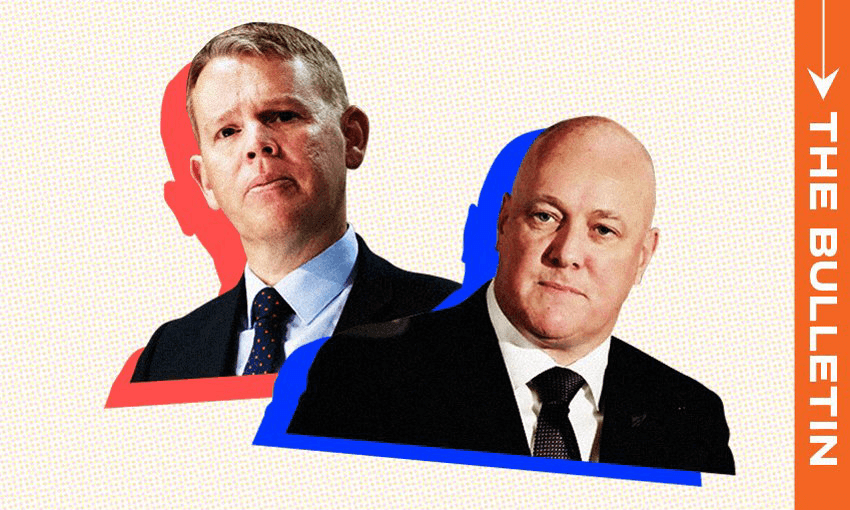NZ First is already eyeing up its 2026 campaign, while Labour is promising a ‘reset’, writes Stewart Sowman-Lund in this extract from The Bulletin.
To receive The Bulletin in full each weekday, sign up here.
12 months since a vote for change
It’s exactly one year since New Zealanders headed to the polls in the 2023 general election, though as we should all remember, not quite a year since the coalition government came into power. 1News’ Anna Murray has looked back at the past 12 months, reflecting on what the government has managed to tick off its to-do list thus far. Seeing the list of achievements in rough chronological order really highlights just how much of the government’s initial work was about stopping work introduced by Labour – from the clean car discount to Let’s Get Wellington Moving, through to the possibility of letting 16 year olds vote in local elections. Soon after, work was under way to introduce and pass numerous new pieces of legislation, with Christopher Luxon announcing business-like “quarterly plans” that focused on key areas.
On The Spinoff this morning, we’ve published an extract from Back on Track? The New Zealand General Election 2023, edited by Stephen Levine, a collection of personal reflections on last year’s campaign. In an excerpt from the book, Luke Oldfield looks at the populism, starting with the protest at parliament in 2022. Turning to Labour, Oldfield suggests the party seemed “unwilling or unable to respond” to the then-opposition’s populist messaging, which in part contributed to the crushing defeat and “inevitably” played a role in Winston Peters’ return to parliament.
NZ First eyeing up 2026
Speaking of Winston Peters, one narrative that has built over the past 12 months has been the resurgence of New Zealand First. The party has famously struggled to stay in parliament for more than one term after being in government and, as noted in a recent column for the Herald (paywalled) by Matthew Hooton, support for the party often slips away quickly after an election result. But not this time, with almost all polls (bar a 1News Verian poll in April) showing New Zealand First comfortably above 5%.
Leader (and current deputy PM) Winston Peters sent a clear message to supporters and detractors while speaking in Hamilton yesterday. “We’re getting ready to be fully prepared to do much better,” said Peters of the 2026 election. “But no political party has been under so much scrutiny and criticism unfairly than the party you’re a member of.” And evoking his favourite, Chumbawamba: “We get knocked down, but we get up again.”
Peters was in Hamilton for the New Zealand First annual conference, which this year was attended by about 900 people (and disrupted by several protesters). In a lengthy address yesterday, Peters revealed new party policy (not yet signed onto by the coalition) in the form of a proposed $100b infrastructure fund. In analysis for RNZ, Russell Palmer noted that while Peters intends to push for this policy now, it may end up being on his party’s agenda come 2026 if he can’t win over his cabinet colleagues. With his tenure as deputy prime minister nearing its end, it’s not out of the question that Peters’ re-election campaign is already about to begin.
Coalition hoping for poll bump tonight
A new 1News Verian poll will be released tonight, which the government will be quietly hoping provides a better result than the most recent Curia poll made public before the weekend.
That poll, released while the prime minister was in Laos, provided an unwelcome book end to the first 12 months of the coalition government. As reported by The Post, it had support for National down by 4.1 points to 34.9% while Labour had bounced up 3.6% to 30.3%. While it wouldn’t result in a change of government – the centre left bloc would still be a handful of seats short – it’s an interesting indicator of the lukewarm support for both major parties. Polls routinely bump around and none can be taken in isolation, but bar the occasional outlier the trend of the past 12 months has been one of consistency as both blocs have remained relatively steady. Christopher Luxon, unsurprisingly, told reporters: “I just don’t care”.
Writing for Interest, Dan Brunskill suggested that National’s latest drop in support could be due to a series of controversies related to issues of health, from Casey Costello’s questionable smoke free proposals to the recent move to downscale the Dunedin Hospital development.
Labour planning ‘reset moment’
Many commentators saw the collapse of Labour as the defining narrative of last year’s election. “No matter the extenuating circumstances, and again there were many, to go from a historic high, above 50% in the 2020 election, to a result last night below 27%? A horror show,” wrote The Spinoff’s Toby Manhire the day after the election.
The party has spent the last year in reflection mode. In an interview with me last December, Chris Hipkins said he was looking to develop a a “refreshed manifesto” and “a really clear vision for the future of the country” in time for the 2026 election.
Labour has remained relatively quiet over the past year, opting not to “bark at every passing car”. That approach is going to have to change soon. Speaking to AAP in a piece shared here by the Otago Daily Times, Hipkins remained determined he could refresh and reinvigorate his party in time for the 2026 election. “We’ve spent a year not really talking about what we would do differently because we wanted to hear from people,” said Hipkins, who expects to reveal the party’s new direction in a speech next month.
“It will be the reset moment.”
